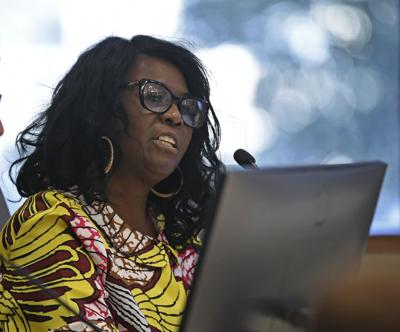Private businesses that want to work with East Baton Rouge's city-parish government will have to change their hiring process to comply with a new ordinance that advocates say will provide more opportunities for formerly incarcerated people.
The ordinance, which the Metro Council narrowly approved in a 7-to-5 vote Wednesday, bars contractors and sub-contractors doing work with the city-parish from asking job applicants about their criminal history until late in the hiring process.
"We just want to make sure those citizens that are looking for a second chance get that opportunity, and it's good for business," said Councilwoman Chauna Banks, who sponsored the item.
Businesses still can perform background checks on prospective employees but have to wait until after making a conditional offer of employment, according to the ordinance. Businesses wouldn't be required to hire people with criminal records but are encouraged to do so if the offenses have nothing to do with the work to be performed, Banks said.
The ordinance does not apply to all potential hires for a company, rather just the applicants for jobs created for a city-parish contract.
To give the city-parish Purchasing Department time to implement the new requirement for contractors, the ordinance has an effective date of 180 days after its passage.
The ordinance does not apply to certain city-parish departments and agencies that deal with public safety, including the Baton Rouge Police Department, Emergency Medical Services, the Finance Department and the Greater Baton Rouge Airport District, among others.
The concept, known as "ban the box," is already mandated for the city-parish's and state's hiring processes and has become more common nationally over the past decade.
The proposal expands Banks' 2018 ordinance that required the city-parish to remove questions about criminal history from its government job applications. That ordinance built on a 2015 resolution by state Sen. C. Denise Marcelle, who was a councilwoman at the time; it encouraged the city-parish to follow a national trend of implementing the practice.
Banks worked on the measure for more than a year with the Power Coalition for Equality and Justice, a progressive voting rights group in New Orleans.
Louisiana has the highest rate of incarceration in the nation, which leaves many people unable to find businesses willing to hire them when they get out, said Kaitlyn Joshua, an advocate for the Power Coalition. The lack of opportunities leads many to re-offend, increasing crime rates in communities, Joshua said.
Mayor-President Sharon Weston Broome also applauded the council's approval of the ordinance.
"By embracing Fair Chance Hiring policies, we are creating a more just and equitable society while sending a clear message that we value diversity, inclusivity, second chances and opportunity for all in Baton Rouge," Broome wrote in a statement.
Councilman Dwight Hudson said the city-parish is overstepping by telling businesses how to conduct their hiring process. Hudson opposed the ordinance along with members Laurie Adams, Rowdy Gaudet, Brandon Noel and Jennifer Racca.
"I would commend any business that on their own would comply with this type of policy in their own hiring — I think it's a good thing," Hudson said. "It doesn't mean it has to be a mandate from city-parish. It doesn't mean we have to go in and tell business owners who are putting their capital at risk on how to manage their business."
Advocates for the proposal repeatedly noted the lack of organized resistance to the ordinance from the business community in response to council members' concerns. No person spoke before the council in opposition to the ordinance.
The ordinance also creates an avenue for job applicants to lodge complaints with the city-parish if they feel a business is not complying with the ordinance. The ordinance does not allow for job applicants to take direct action against the city-parish or a company if they aren't hired for a job, such as a civil lawsuit.
Contractors are already expected to meet a plethora of city-parish requirements, including fair hiring practices for minorities and other protected groups, Banks noted.
Companies that fail to follow any of the terms of a city-parish contract face penalties ranging from a written warning to termination of the contract, representatives from the Parish Attorney's Office said.

